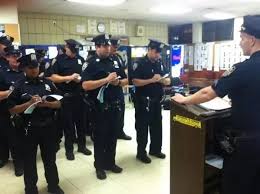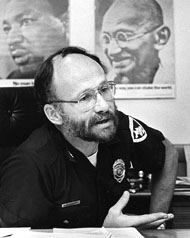
I would like to talk to you today in light of all that has transpired around our country as a result of George Floyd’s death in Minneapolis.
Most of you chose to be police officers because you actually wanted to “serve and protect.” But along the way, something happened, some of you lost your way. Maybe it was because the bad cops you had to work with. You know, the guys on your shift who told you to forget everything you learned in the police academy and if you acted like them, you will get along just fine. These rogue cops literally silenced new officers; those good hires who had a heart for others, were compassionate, controlled in their use of force, and respectful.
Let me share a part of my journey. When I was a young Minneapolis police officer, I wrote an op-ed for the Minneapolis Tribune. It was during the civil rights movement and we had a lot of racial tension in the city between cops and blacks. I wrote in the article that we were different; a new order of professional police who “pledge equal, fair law enforcement regardless of a man’s [sic] race, color or creed. May this be a public pledge of good law enforcement in our community.”
The next day, I was summarily called into the chief’s office and threatened with discipline. I was told, “You have no right to do this without department permission!” Because I was a then a student and president of an organization of cops who were college graduates or, like me, working toward my degree at the University of Minnesota. My professors quickly came to my defense. They contacted the mayor and other city leaders in my behalf. The matter was dropped and I returned to work.
Today, you need to do the same thing. You need to stand up, declare, and define yourselves as officers who will treat others respectfully and will not use deadly force unless it is “absolutely necessary.”
That is the force standard to which all countries in the European Union must agree. Unless the present numbers of black men killed by police is significantly reduced, there will be no trust, no support, no peace in our cities. Shooting and killing someone just because you were frightened is not being acceptable any more.
You, of course, are not responsible for systemic inequalities within our society. But you are responsible to act morally and on the values to which our nation holds dear. You have a responsibility to call out the bad cops who verbally and physically abuse people. Bad cops working with impunity and no censure from the good cops can no longer be tolerated by you. To put it bluntly, it’s bad for business and bad cops put you in physical danger
You know that instilling fear and abusing citizens is not the way to police. When we police our communities by fear, the practice soon goes awry. Fear mongering will never develop the trust and cooperation needed for you to do an excellent job of policing a democratic society. That’s why community-oriented policing works. It builds trust and cooperation..
In 1967, a National Commission Advisory Commission on Civil Disorders was formed by President Johnson and chaired by Otto Kerner, former Governor of Illinois. I still remember their warning, “Our nation is moving toward two societies, one black, one white – separate and unequal.” I committed my career to bring those communities together and work against inequality. I hope you make the same commitment for the gap still exists today.
When a police officer is viewed as biased, unfair, disrespectful, or not willing to listen, it has a negative impact on society as a whole. You do one thing bad and it is captured on video, the whole nation thinks poorly of all police officers. It puts every police officer in danger. When a police officer takes the life of a black man, it is an immediate and visceral signal to black America that black lives do not matter.
The only way this will ever change is if you stand up and declare that you are a fair, respectful, and lawful police officer; that you follow the law, are controlled in your uses of force, will be accountable for your actions; that you can be trusted when you encounter people of color.
But there’s more that is needed, you must be willing to intervene when another officer is not behaving in a legal or proper manner.
This is called Peer Intervention. And it works. It has the potential to improve everything you and deposit large amounts of trust into your department’s “trust-bank.”
In order to do this, you must stand up and say, “I think we should all help each other become better officers. I want you to know that if I should ever do anything in your presence that could result in my embarrassment, suspension, loss of job, or prison time, I want you to know that it is okay to intervene; to stop me. Can I have the same commitment from you?”
You may say, “Get real, I can’t do this because those bad officers will harm me by not showing up if I have to call for help. They may even threaten me.” Okay. I understand. But look around you. There are probably enough good officers in your work unit who believe the same as you do. Talk to them. Work with them. Organize. Because that will put the bad cops in the minority and on the defensive. It is they who will have to improve their behavior — or find another job.
I know one thing from being a cop for over 30 years and that is that I can change and improve; I can be a better cop. How I behave, regardless of how others are behaving around me, matters. I believe every cop has influence and is, regardless of rank, a leader.
So, I am asking you to lead. To be the change you know must be made.
You are our nation’s future.
Any questions?


Well put Chief, another thing is asking yourself “Would I do this if he was white?” and treating other as you want to be treated.
LikeLiked by 1 person
Once again, Chief, you are a great example for all police to follow. Thank you.
LikeLiked by 1 person
Reblogged this on Square Cop In A Round World and commented:
“In order to do this, you must stand up and say, “I think we should all help each other become better officers. I want you to know that if I should ever do anything in your presence that could result in my embarrassment, suspension, loss of job, or prison time, I want you to know that it is okay to intervene; to stop me. Can I have the same commitment from you?”
LikeLiked by 1 person
Much as I admire your work overall and admirable successes in Madison (where I lived during most of your tenure there), I am troubled by a very small thing. It is easily fixed, I’m sure. In the 3rd paragraph of the post below appear the words “I wrote are different…”. I believe there are words missing here. I have read almost exactly the same thing in other documents available on your website and blog.
I urge you to find someone to seriously proof-read and fix this problem wherever it appears.
Thank you for attending to my request. Best wishes. I hope every cop reads this post. We Americans need your wisdom now and in the future.
Fred Juergens 43 N. 2nd. St. Evansville, WI 53536 608-728-4437
>
LikeLiked by 1 person
I appreciate your counsel. Thanks.
LikeLiked by 1 person
The police as a group and as individuals did play an important part in helping to create and maintain systemic inequalities within our society. Without the police and the court system, the systemic inequalities would have cease to exist a long, long time ago.
LikeLiked by 1 person
Maybe.
LikeLiked by 1 person
You can’t expect let alone demand that the police do their job when the Supreme Court has ruled that the police are not obligated to provide protection of citizens.
LikeLiked by 1 person
Regardless of the USCC decision in Graham v. Connor, police could, by policy, raise the standard higher!
LikeLiked by 1 person
This is amazing! Thank you for sharing, Chief!
LikeLiked by 1 person
Your are right, of course. But the movement against police overreaction would have far greater moral authority if it bothered to point out that whites have also been abused or even unjustly killed by police.
I
https://en.wikipedia.org/wiki/Shooting_of_Daniel_Shaver
https://www.washingtonpost.com/news/post-nation/wp/2017/12/08/graphic-video-shows-daniel-shaver-sobbing-and-begging-officer-for-his-life-before-2016-shooting/
https://michaelbell.info/MBell-HP.html
LikeLiked by 1 person
That’s true… but I look at rate and circumstances as well. Thanks for contributing to this needed conversation.
LikeLiked by 1 person
This was a lovelly blog post
LikeLike